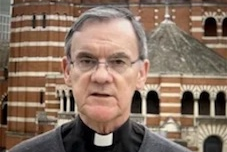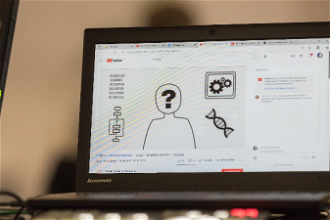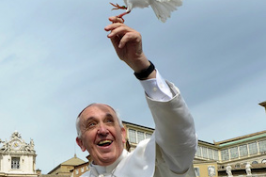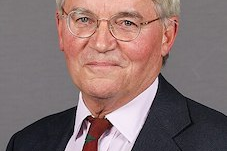Rome: The Church Up Close - Day 4
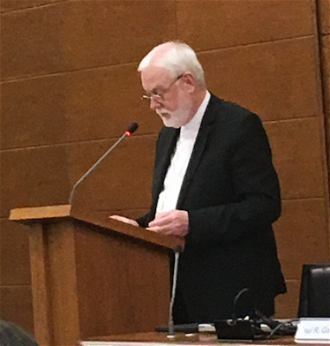
Archbishop Gallagher
"The United Nations is vital, and without it we would go back to the jungle". The Holy See's work on the international stage was presented in a talk this morning by Archbishop Paul Richard Gallagher, Secretary for Relations with States of the Vatican Secretariat of State, who hails from Liverpool. He told journalists from 16 countries that in an age of global interdependence the Holy See offers an ethical vision in many forums, especially UN bodies. The Holy See is a member of various bodies, including the International Atomic Energy Agency (IAEA), and the United Nations High Commissioner for Refugees (UNHCR). It is a permanent observer in the UN General Assembly, UNESCO (United Nations Educational, Scientific and Cultural Organisation), the World Trade Organisation (WTO), the World Health Organisation (WHO) and the Food and Agriculture Organisation (FAO). Pope Paul VI and Pope Francis have spoken at the UN in New York.
The outreach of the Secretariat of State ranges from supporting global pacts on Migration ("a wound in the social fabric of the human family"), to helping the international community meet climate change commitments made at the 2015 Paris Climate Talks, to promoting the right to clean water and food. Human Rights, Solidarity and Peace are major issues today and inspirational social teaching documents Archbishop Gallagher mentioned included Pacem in Terris, Populorum Progressio, Sollicitudo Rei Socialis, and Laudato Si. I might say that these are documents well known to Catholics working in the areas of Justice, Peace and Ecology. The Holy See has supported treaties to ban anti-personnel mines and nuclear weapons. He felt it was important to "delegitimise" nuclear weapons for "they offer a false sense of security".
Archbishop Gallagher suggested that journalists could highlight more the good things the Holy See is trying to do to promote the common good. As well as tackling global structural problems, he highlighted that the Church internationally runs one quarter of the world's HIV/AIDS treatment centres, 610 leper treatment centres, and over 2000 special education centres. Assisting needy and vulnerable people is top priority and the presentation of the Holy See's mission to "hear the cry of the poor and the cry of the Earth", as it says in Laudato Si, was impressive and moving. Catholics are around 16 percent of humanity and a significant "soft power" global network.
Later, missionary priests with extensive grassroots experience in Asia spoke about 'The Future of the Church in Asia'. Asia has 4.3 billion people, that is two thirds of humanity, but in most Asian countries Christians are minority communities. Australian Columban Robert McCulloch, who worked in Pakistan for 34 years, was critical of Pakistan's blasphemy laws which "have consistently been mis-used and abused as a means to control and marginalise non-Muslims through a reign of fear". He has deep respect for Pakistani Christians who have a "deep spiritual reservoir of faith" that helps them cope. His report was humbling for those of us Christians who can practice our faith without fear or sacrifice.
We heard presentations on the forthcoming Synod of Bishops on Youth and Vocation. It will definitely be going ahead said Bishop Fabio Fabene, who acknowledged that some bishops, particularly in the United States, called for it be cancelled or deferred in the light of the abuse scandal. Around 35 youth will be attending. The role of women in the Church was highlighted by Professor Llaria Morali of the Pontifical Gregorian University. She felt that reform is happening, that Pope Francis is urging more professional jobs in Holy See bodies and Catholic universities to be open to women. However, she also felt that change is slow. "Over the last 30 years women of high quality have not been treated well, but there are some exceptions" she said.
The day was rounded off with a visit to the residence of the British ambassador to the Holy See, The Honourable Sally Axworthy. I might have been a bit familiar with my 'Hi Sally' but I was so relieved to be met at the top of seven flights of stairs with a welcome smile and a gin and tonic. Dainty 'envelopes' with fish pieces and chips followed. We were on a breezy roof terrace at sunset overlooking Rome, with the Vatican on one side and the Colosseum on the other. She spoke of her engagement with the work of the Holy See, particularly on Migration, Human Trafficking and Climate Change. And dealt with a few challenging questions about possible tensions between Holy See peacemaking and Britain's role as a leading arms trader and with a nuclear weapons programme. She admired Pope Francis' outreach to 40 million twitter followers. But I will take away something she said that chimed with Archbishop Gallagher's report that morning. She told us that the mission of Pope Francis and the Holy See is perhaps to biggest "moral force" in today's world.



